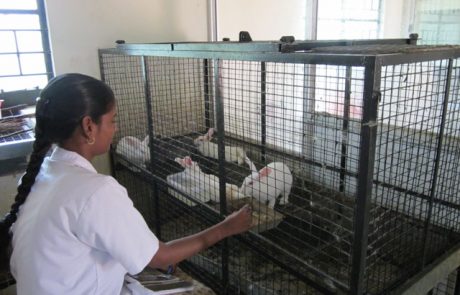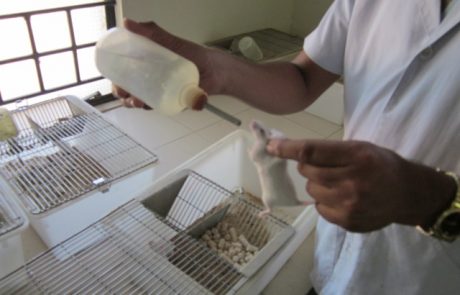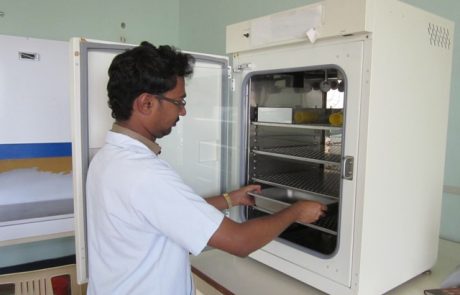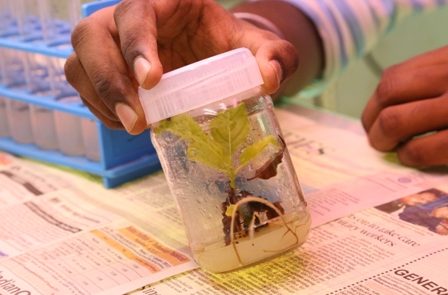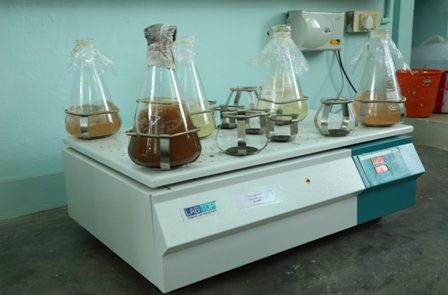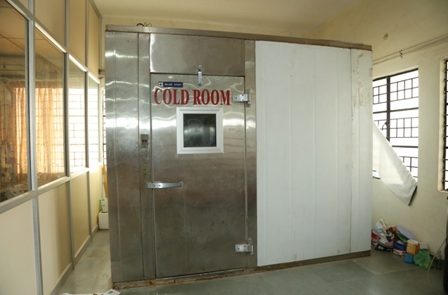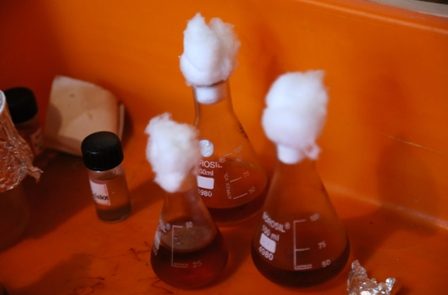Studying Biotechnology at Sri Kaliswari College is every aspiring graduate’s dream. The laboratory facilities are not only high-end but also designed to cater to the needs of each student’s research quest at every level; Undergraduate, Postgraduate and Doctoral.
The Biotechnology department houses two separate laboratories. One lab is dedicated to conducting practical experiments in the fields of microbiology, immunology, microbial cell culture and maintenance. The other lab enables students to separate bio-molecules from various sources, such as plant and animal tissues, and blood.
Students from across the country opt for a programme in this department, thanks to its highly driven and dedicated faculty, excellent facilities, and a practical approach to learning that renders each graduate a perfect match for the profession of his / her choice.
To impart quality higher education in the field of Biotechnology that intensely impact the existing paradigm of agriculture, industry, health care, and sustainable environment .
To become a pioneer department of higher learning, imparting state of the art education, training, and research in the field of Biotechnology.
To generate skilled manpower in different areas of Biotechnology to work in the Biotechnology related industries.
To contribute to the advancement of science through applied research leading to the development of innovative products.
| Course Name | Year of Establishment |
|---|---|
| B.sc.(Biotechnology) | 2002-2003 |
| M.Sc. (Biotechnology) | 2004-2005 |
| Staff Name with qualification | Staff Id | Designation |
| Dr.M.Sujatha M.Sc., M.Phil., Ph.D., SET, | A/TS/287 | Head & Assistant Professor |
| Mrs.P.Devi M.Sc., M.Phil., | A/TS/631 | Assistant Professor |
| Mrs.G.Mareeswari M.Sc., M.Phil. | A/TS/666 | Assistant Professor |
| Dr.V.Pradeepa M.Sc., M.Phil., Ph.D., SET, | A/TS/735 | Assistant Professor |
| Dr.A.Rajalakshmi M.Sc., Ph.D. | A/TS/736 | Assistant Professor |
| Dr.P.Suganya M.Sc., M.Phil., Ph.D. | A/TS/737 | Assistant Professor |
| Mr.T.Victor Athisayam M.Sc. Ph.D | A/TS/758 | Assistant Professor |
The Animal House facility has been established and is being maintained regularly in our college. It is located at west of the New Library with 1500sq feet. Sri Kaliswari Animal House maintains mice and rabbits with air conditioned facility. Mice are used to carry out immunology experiments. The facility is being used to support research to maintain animals in appropriate environmental conditions with all essential facilities for experimental works. The Animal House facility was designed and maintained as per the rule of the Animal Ethical Committee, New Delhi.
Snap Shot
There are five spacious laboratories for biotechnology – Plant tissue culture, Instrumentation, Animal tissue culture, Bio-chemistry and Bioinformatics. The labs are equipped with state-of-the art facilities which include microbial culture maintenance facility, bio-safety laminar flow, slit-fermenter and walk-in cold room. The following are the advanced lab equipment constantly in use
- Ultra freezers.
- PCR.
- ELSIA readers.
- Gel-documentation system.
- Lyopholizer.
- Refrigerated microfuge.
- Nikon 50i epi fluorescent unit with dark field phase contrast fluorescents and phase contrast microscope 10 computer with internet facility.
- Incubator.
- Four fire extinguishers.
- Separate animal house and separate fish tank.
The advanced equipment’s
Bioinstrumentation Center
Excellence in teaching and research by Science departments need state-of-the-art sophisticated equipments, various workshops and support facilities. These equipments and facilities help the faculty, research scholars and students to carry out globally competitive R & D in basic and applied sciences. Since individual departments may not be able to generate required research facilities, a Central Instrumentation center was started with a mission to enrich the resources on a shared basis for promoting R and D.
Lyophilizer
Lyophilization / freeze drying is a method of extracting the water from Biological samples, foods and other products so that foods or products remain stable and are easier to store and preserved at room temperature. Biological materials should be dried to stabilize them for storage, preservation and shipping. In many cases this drying can cause damage and some loss of cellular or protein activity. Lyophilization significantly reduces damage to biological samples.
CO2 Incubator
CO2 incubators are necessary equipment for research and clinical laboratories conducting cell culture and tissue culture work. CO2 incubators can be used for routine applications such as cell cultivation or for specific protocols such as IVF and stem cell applications (oocyte collection and prep, pre-implantation diagnostics, embryo transfers and sperm preparation.). A CO2 incubator is used to culture cells to provide it with the optimum temperature, moisture (sterile environment) and to maintain optimum PH. When the media contains carbonate buffer, the CO2 gas from the cylinder is let into the incubator in such a way that the pH remains constant.
Phase contrast Microscope
Phase contrast is by far the most frequently used method in biological light microscopy. It is an established microscopy technique in cell culture and live cell imaging. When using this inexpensive technique, living cells can be observed in their natural state without previous fixation or labeling.
Fermentor
A fermentor or fermentation chamber is a type of bioreactor for containing and controlling fermenter microorganisms. Fermentation is an economical route to important raw materials (ethanol, lactic acid) and fermented foods. A fermentor must control temperature and keep the chamber anaerobic (free of oxygen) to optimize conditions for desired microbial fermentation. Fermentation is a basic and highly developed art, as well a pursuit of hobbyists.
Cooling Centrifuge
Refrigerated centrifuge works on the concept of sedimentation principle by holding up the sample tubes with a capacity of 2ml, 10ml and 50ml in rotation around a fixed axis. In this, the centripetal force causes the denser substances to separate out along the radial direction in the bottom of the centrifuge tube. The rate of the centrifugation is calculated by the acceleration applied to the sample and it is typically measured in revolution per minute (RPM) or relative centrifugal force (RCF). The particle’s settling velocity during centrifugation depends on the function of their size and shape, centrifugal acceleration, the volume fraction of solids present, the density difference between the particle and the liquid, and the viscosity. This equipment is extensively used in chemistry, biology, and biochemistry for isolating and separating suspensions. It additionally provides the cooling mechanism to maintain the uniform temperature throughout the operation of the sample. Refrigerated laboratory centrifuges temperature ranges is 40C, making them perfect for DNA, RNA, PCR or antibody analysis. It is important to seek refrigerated laboratory centrifuges with efficient cooling systems, automatic unit conversion capability, and other high-throughput enabling features.
Cold Room
Cold storage rooms are temperature adjustable, they can be used for different functions by adjusting the temperature to change from a drying room to help control the moisture content of the products being stored to a blast freezer. These units are airtight, they will also help to protect your products from extreme temperature and weather changes that will happen outside of the unit. Another great thing about these containers having an adjustable temperature range is that they can be used as a dehumidifier to help to dry out and control the moisture content when dry storage is needed. Simply set the unit to the preferred temperature and the cool storage unit will take care of the rest.
Biosafety Cabinet
Biosafety is an important element of quality management systems in laboratory practice as it is a measuring tool for compliance with accreditation and certification standards. The concept of biosafety in laboratory practice is one that is of utmost important; and as such it must be given top priority at all times. The field of biosafety covers risk assessment, management of such risks, the regulation, communication and mitigation of adverse events with the aim of promoting a safe environment for Clinical Laboratory testing. There must be a continuous concerted effort on the part of laboratories to ensure that their testing procedures are safe and in line with international best practices both for the safety of staff and patients and also to safeguard the immediate environment from potentially hazardous pathogens. Our aim was to assess the practices of laboratory personnel towards biosafety measures in their respective laboratories. The application of biosafety principles also ensures the mitigation of risk with respect to litigation as it pertains to laboratory acquired infections. The knowledge and application of biosafety principles also ensure that test methods are safe in the laboratory and that potentially infectious pathogens are handled with minimum risk to laboratory staff.

